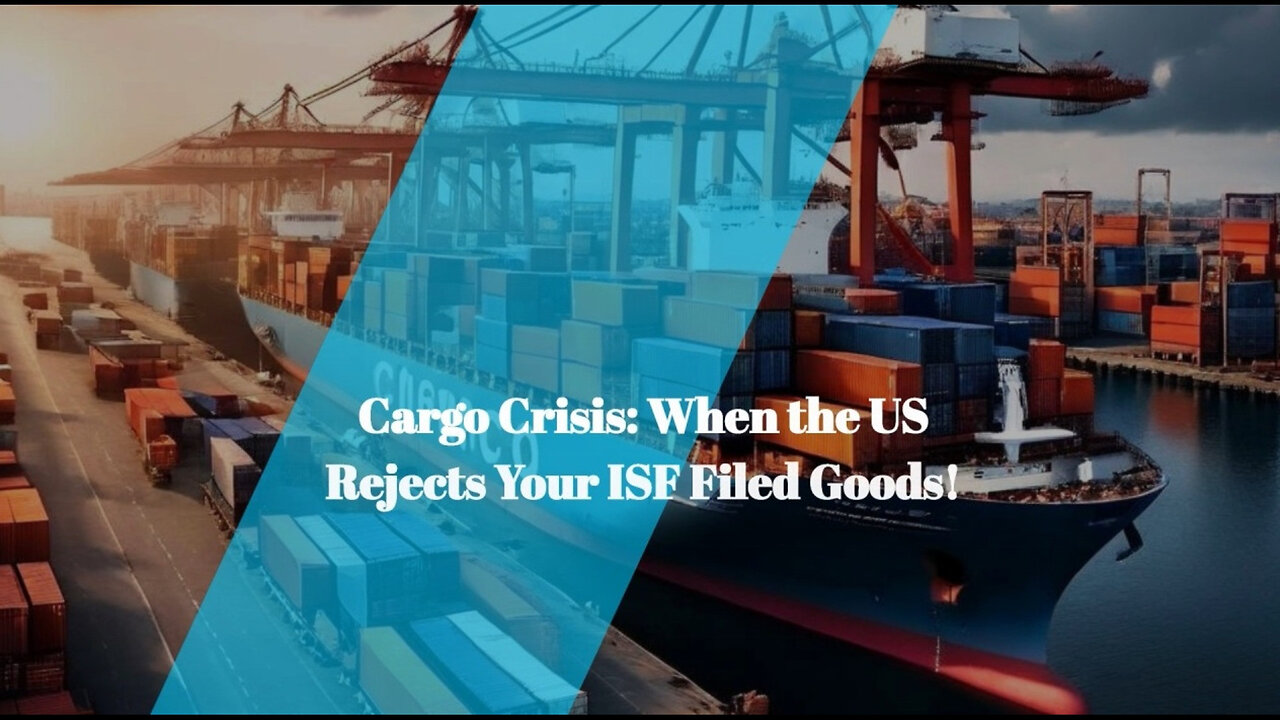Premium Only Content

What Happens When Your Imported Cargo Gets Rejected? Find Out Now!
ISF Cargo | Phone: 786-865-0459
Email: isf@isfcargo.com | https://isfcargo.com
In this video, we discuss what happens if the Importer Security Filing (ISF) is filed but the consignee rejects the cargo upon arrival in the US. The ISF is a requirement by US Customs and Border Protection (CBP) and contains important information about the cargo. In the scenario where the cargo is rejected, the consignee has a few options. They can work with their customs broker to resolve customs-related issues, abandon the cargo if they don't want to address compliance issues, or arrange for the return of the shipment if the rejection is unrelated to customs. Prompt communication between the consignee, customs broker, and carrier is essential to minimize disruptions in the supply chain and ensure appropriate action is taken.
#usimportbond #isfcustomsbroker #uscustomsclearing #isfentry
Video Disclaimer Here: This content is for educational use and not associated with any US government body.
00:46 - ISF Overview: The Importer Security Filing (ISF) is a mandatory electronic submission required by U.S. Customs and Border Protection for all cargo imported by vessel, detailing essential information about the shipment, including the shipper and consignee.
01:28 - Consequences of Cargo Rejection: If a consignee rejects cargo upon arrival in the U.S., they have several options, including working with a customs broker to resolve customs-related issues or abandoning the cargo, which requires notifying both the carrier and CBP.
01:53 - Abandonment and Liability: If the cargo is abandoned, the carrier may have the right to sell or dispose of it to recover unpaid costs, so consignees must understand their obligations and potential liabilities in such situations.
02:09 - Return of Shipment: If the rejection is not customs-related, the consignee can arrange for the cargo to be returned to the origin port, which involves coordinating with the carrier and may incur additional transportation costs. Prompt communication with the customs broker and carrier is crucial to minimize supply chain disruptions.
-
 59:57
59:57
The StoneZONE with Roger Stone
3 hours agoJ6 Martyr Enrique Tarrio Describes Inhumane Prison Conditions Ordered by Biden | The StoneZONE
7.39K -
 16:48
16:48
Tundra Tactical
2 hours agoAffordable Medical Gear From ACETAC SHOT Show 2025
3.58K1 -
 1:46:16
1:46:16
Redacted News
5 hours agoRFK CONFIRMATION: Kennedy goes to WAR with Big Pharma Democrats in Fiery Hearing | Redacted Live
156K310 -
 57:31
57:31
Candace Show Podcast
6 hours agoBREAKING! Taylor Swift Turns Against Blake Lively & Ryan Reynolds | Candace Ep 141
164K169 -
 1:04:59
1:04:59
Sarah Westall
3 hours agoRFK Jr Report, Constitution Suspended, War Time Procedures in Place, WHO Exit, DOD w/ Sasha Latypova
14.5K12 -
 1:56:37
1:56:37
Melonie Mac
7 hours agoGo Boom Live Ep 35!
28K9 -
 1:01:13
1:01:13
LFA TV
10 hours agoPRESIDENT TRUMP SIGNS LAKEN RILEY ACT | BASED AMERICA 1.29.25 6pm
42K6 -
 1:43:07
1:43:07
2 MIKES LIVE
4 hours ago2 MIKES LIVE #172 News Breakdown Wednesday!
16.4K2 -
 1:26:16
1:26:16
The Big Mig™
5 hours agoJ6’r Ryan Samsel Free At Last The BOP & DOJ Exposed
18.3K3 -
 31:34
31:34
The Based Mother
5 hours ago $0.70 earnedEXECUTIVE ORDER MUTILATES GENDER IDEOLOGY! Trump’s pulling out all the stops.
12.9K2